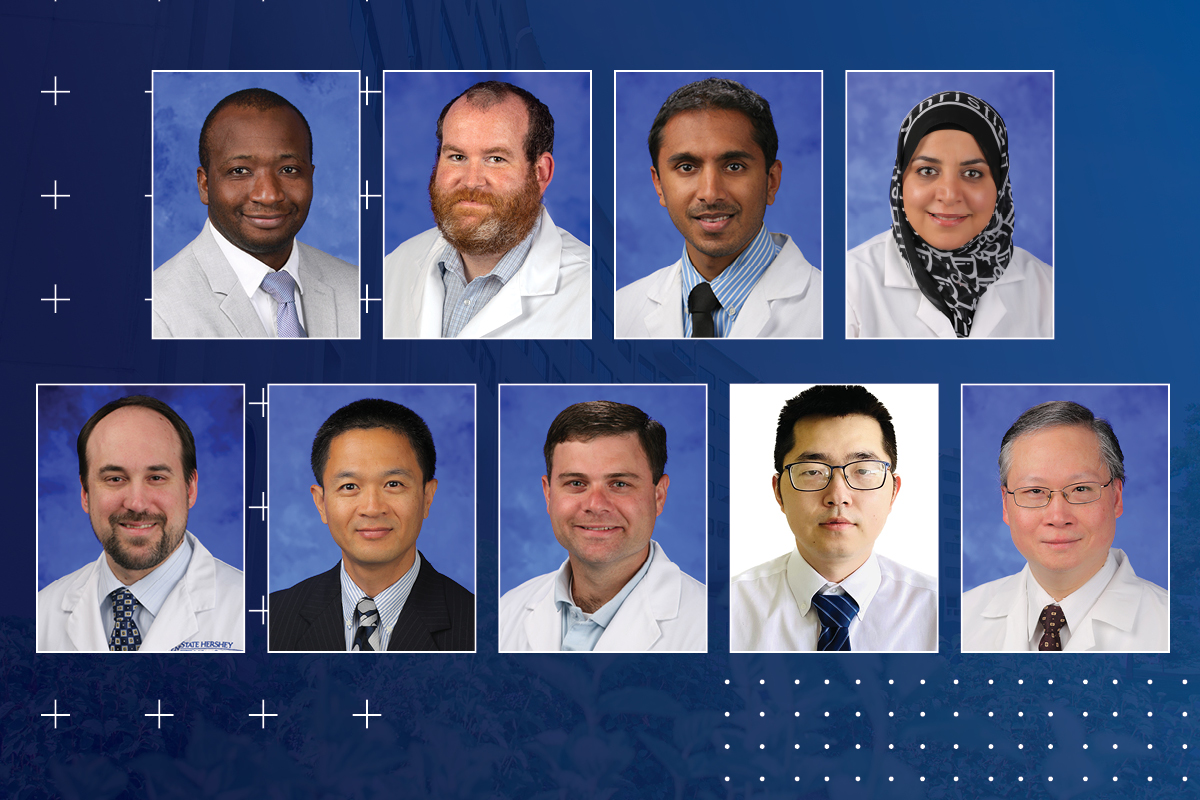College of Medicine faculty receive biomedical artificial intelligence grants

Strategic Plan funding affirms College of Medicine’s commitment to apply artificial intelligence, neural engineering, machine learning and informatics to solve complex health challenges
Penn State College of Medicine leaders awarded $225,000 in pilot funding to researchers as part of goal two of its strategic plan focused on artificial intelligence and biomedical informatics. Faculty will apply cutting edge approaches in biomedical artificial intelligence, machine learning and informatics to make rapid advances in biomedical research.
Nine investigators received seed funding for their proposed research projects to address biomedical and health challenges using state‑of‑the‑art technology and computational innovation.
“Artificial intelligence and biomedical informatics are revolutionizing biology and medicine,” said Dajiang Liu, PhD, leader of Goal Two of the College of Medicine’s strategic plan. “Our faculty have proposed innovative projects that will use artificial intelligence and informatics methods to extract meaningful patterns and information in large datasets that can be used to develop new therapeutics, diagnostics or preventive strategies.”
The goal of the awards is for faculty to develop research ideas into proposals that lead to external funding from the National Institutes of Health and other leading research funding institutions, and translate those discoveries into improved health and health care for the diversity of communities the College of Medicine and Penn State Health serve and humanity at large.
“I congratulate our faculty for receiving these funds that will not only help them explore innovative ideas, but also change how the College of Medicine utilizes leading edge technology to conduct health research,” said interim dean Kevin Black, MD. “Machine learning and artificial intelligence have the potential to transform both the speed and accuracy with which life-saving discoveries can be made.”
Catalyst Awards
“A Collaborative Study on Examining Treatment Guideline Concordance in Mood Disorders Using Administrative Claims Databases”
Investigator: Guodong Liu, PhD – professor of public health sciences; psychiatry and behavioral health; neurology; pediatrics
Grant amount: $10,000
Goal: Liu will assemble a multidisciplinary research team to determine if it is feasible to use large medical insurance claims databases to examine guidelines concordance, or consistency, in treating bipolar disorder (BD) and major depressive disorder (MDD), based on a machine-learning approach. The success of this study will generate pilot data and set the foundation for future studies to identify barriers and potential interventions to promote guideline-concordant BD/MDD treatments.
“Mapping post-transcriptional modifications in human extracellular miRNAs”
Investigator: Jian Wang, PhD – assistant professor of pharmacology
Grant amount: $10,000
Goal: Wang aims to develop a machine-learning bioinformatics tool to study modifications made to microRNAs —small fragments of genetic material involved in gene expression — following DNA transcription. As miRNA is increasingly found in biological fluids, studies that better characterize them will help scientists and physicians to use miRNAs as biomarkers, or signals, of various health conditions.
“Machine Learning Analysis of Thyroid Mass CT Imaging”
Investigator: Neerav Goyal, MD – associate professor and vice chair for research – Department of Otolaryngology – Head and Neck Surgery; associate professor of neurosurgery; public health sciences
Grant amount: $10,000
Goal: With a multidisciplinary team from the Departments of Radiology, Public Health Sciences and otolaryngology resident Chris Tseng, MD, Goyal will develop machine learning algorithms and study whether they can determine the difference between benign and cancerous thyroid masses found on CT imaging. Developing such a tool could help minimize the use of additional healthcare resources and testing and provide an algorithm to diagnose thyroid cancer on CT imaging.
Other Catalyst Award Winners
“Personalized Deep Learning for Pancreatic Cancer Risk Assessment and Diagnosis Prediction”
Investigator: Nelson Shu‑Sang Yee, MD, PhD – professor of medicine
Grant amount: $10,000
“Using Routine Blood Tests to Identify People at High Risk of Cancer”
Investigator: Roderick Clark, MD – assistant professor of urology; public health sciences
Grant amount: $10,000
Collaborative Pilot Awards
“Do Athletes Who Sustain Lower Extremity Injuries have Unique micro Doppler Signatures? A Feasibility Pilot”
Investigator: Cayce Onks, DO – associate professor of family and community medicine; orthoapaedics and rehabilitations
Grant amount: $50,000
Goal: Onks’ project will study whether micro-Doppler radar technology can be used to identify athletes at high risk for musculoskeletal injuries such as common ligament, bone, tendon and muscle damage that occur to people who are physically active.
“The Association of COVID-19 With Kidney Diseases: Evidence from a Large Real-World Database”
Investigator: Djibril Ba, PhD – assistant professor of public health sciences
Grant amount: $50,000
Goal: Ba will use a large, real-world database to explore whether and to what extent COVID-19 infection may affect a person’s risk for acute kidney injuries or developing chronic kidney disease. The research will also explore how factors like demographics, co-occurring medical conditions, social determinants of health, lifestyle and COVID-19 severity may affect the risk using machine learning approaches.
“Establishing an AI-assisted image analysis system for the clinical testing of paroxetine as a Disease Modifying Osteoarthritis Drug DMOAD”
Investigator: Fadia Kamal, PharmD, PhD – associate professor of orthopaedics and rehabilitation; pharmacology
Grant amount: $50,000
Goal: Kamal and team will use artificial intelligence to read X-rays from osteoarthritis patients to increase accuracy of the method and facilitate clinical studies using a large patient database. The team will use this artificial intelligence method to read X-rays from osteoarthritis patients that were treated with the antidepressant paroxetine for depression and compare them to those who received a different antidepressant or none. They will test the hypothesis that paroxetine can treat osteoarthritis.
“AI-based medical image segmentation for 3D patient-specific surgical planning”
Investigator: Gregory Lewis, PhD – associate professor of orthopaedics and rehabilitation; biomedical engineering
Grant amount: $25,000 (with additional funding from a Center for Biodevices seed grant)
Goal: Lewis aims to use deep learning‑based algorithms to automatically segment CT images of complex femur fractures and generate 3D models. Doing so will allow surgeons to develop surgical plans tailored to patients’ unique injuries.
Learn more about Strategic Plan goal 2
If you're having trouble accessing this content, or would like it in another format, please email Penn State Health Marketing & Communications.
